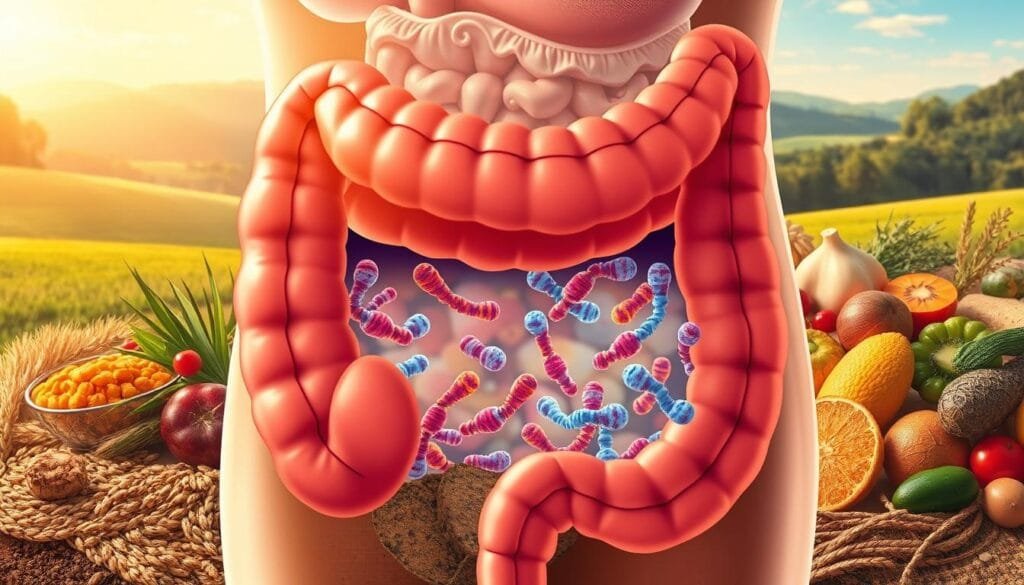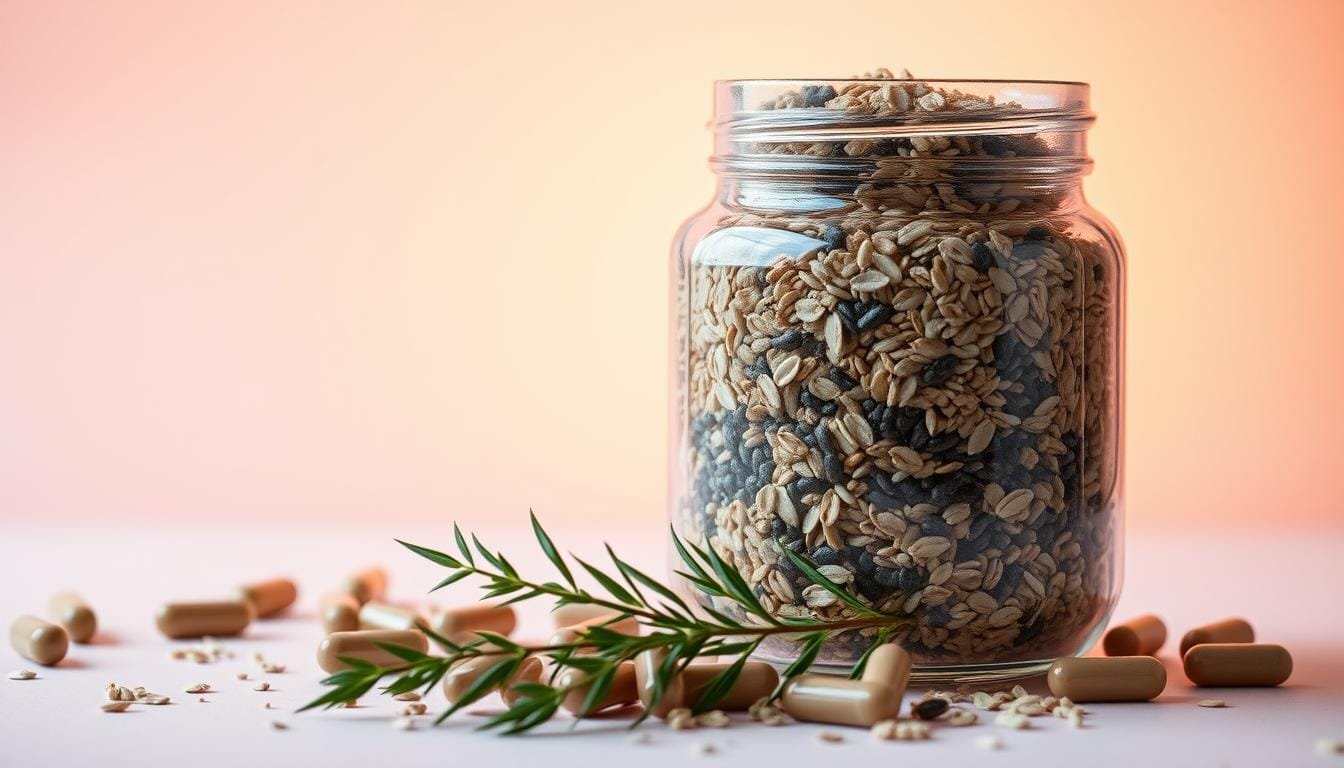Currently Empty: RM0.00
“All disease begins in the gut.” This powerful observation by Hippocrates, made centuries ago, rings truer than ever in our modern world. For many people in Malaysia and beyond, digestive discomfort like bloating and irregularity is a daily struggle. The solution to these common issues often lies in understanding the powerful teamwork happening inside our bodies.
Scientific research reveals a startling fact: the vast majority of people do not get enough dietary fiber. This shortage is linked to less diverse communities of beneficial gut microbes. The relationship between specific types of carbohydrates and our gut’s bacterial residents is the key to unlocking better digestive wellness.
This guide explores the dynamic partnership that creates a thriving digestive system. It breaks down the science into practical, actionable steps. Readers will discover how a special type of carbohydrate, known as prebiotic fiber, acts as a dedicated fuel source for health-promoting bacteria. This nourishment allows these microorganisms to flourish and perform their jobs more effectively.
By making informed choices about food and considering targeted supplement strategies, anyone can take meaningful steps toward improved gut health and overall well-being.
Key Takeaways
- Most people do not consume enough dietary fiber, which can impact gut microbe diversity.
- A healthy gut environment relies on the synergistic relationship between specific carbohydrates and beneficial bacteria.
- Prebiotic fiber serves as a specialized food source that helps good bacteria thrive.
- Improving this internal balance can help address common digestive concerns like bloating and irregularity.
- Practical dietary changes and informed supplementation can support a healthier digestive system.
Introduction to Fiber, Probiotics, and Gut Health
Building a healthy digestive system starts with understanding the fundamental players: dietary fibers and beneficial bacteria. These components work together to create optimal conditions within the digestive tract.
What Are Dietary Fibers and Prebiotics?
Dietary fiber comes from plant-based foods that the human body cannot fully digest. There are two main types that serve different but complementary roles in supporting digestive health.
Soluble fiber dissolves in water to form a gel-like substance that helps soften stool. Insoluble fiber adds bulk to support regular movement through the system. Prebiotics represent a special category that selectively feeds good bacteria.
Overview of Probiotics
Probiotics are live microorganisms that provide health benefits when consumed in adequate amounts. They help maintain a balanced gut environment by supporting beneficial bacterial communities.
When combined with prebiotic fibers, these living bacteria receive the nourishment they need to thrive. This powerful partnership creates optimal conditions for digestive wellness and overall health.
How Fiber Enhances Probiotic Function
A fascinating biological process in the colon transforms simple fibers into powerful health allies. This occurs when specific carbohydrates meet the resident beneficial bacteria.
Mechanisms Behind Enhanced Microbial Activity
These good bacteria ferment certain types of carbohydrates. This fermentation is a key mechanism for boosting their activity. It leads to the creation of valuable metabolic byproducts.
The most important of these byproducts are short-chain fatty acids. Butyrate, acetate, and propionate are the main types. They serve as the primary energy source for the cells lining the colon.
The Role of Short-Chain Fatty Acids
These fatty acids offer numerous health benefits. They help reduce inflammation throughout the body and improve fat metabolism. They also strengthen the gut’s protective barrier.
Furthermore, short-chain fatty acids create an acidic environment in the colon. This environment supports good bacteria and discourages the growth of harmful ones. This balance is crucial for smooth digestion and overall gut wellness.
Role of Prebiotic Fiber in the Gut Microbiome
The gut microbiome functions like a bustling city, with diverse populations working together for optimal health. This complex community of microorganisms requires specific nourishment to maintain its delicate balance.
Enhancing Microbiome Diversity
A rich variety of bacterial species creates a resilient gut ecosystem. Prebiotic fiber plays a key role in promoting this diversity by feeding different types of beneficial microorganisms.
Research shows that greater microbiome diversity correlates with better health outcomes. When various bacterial strains thrive together, they create a natural defense against harmful invaders.
Supporting Beneficial Bacteria Growth
Specific strains like Bifidobacteria and Lactobacilli flourish when they receive adequate prebiotic nourishment. These microorganisms perform essential functions including nutrient synthesis and inflammation regulation.
The relationship between prebiotic fiber and bacterial growth extends beyond simple population increases. Well-fed bacteria become more metabolically active and efficient at their jobs.
This symbiotic relationship demonstrates how dietary choices directly influence the composition and function of our internal microbial communities.
Enhancing Digestive Health with Probiotics and Fiber
Many individuals seek practical ways to support their digestive system and maintain comfortable daily function. Strategic approaches combining specific nutrients can address common concerns effectively.
Improving Bowel Regularity
Consistent bowel movements are essential for digestive comfort. Insufficient fiber intake often leads to constipation, characterized by hard, difficult-to-pass stools.
Increasing dietary fiber adds bulk and moisture to waste material. This combination supports smoother transit through the digestive tract. Specific bacterial strains like Bifidobacteria play a crucial role in maintaining healthy motility.

Preventing Common Digestive Issues
Uncomfortable symptoms like bloating and gas often signal imbalance within the gut environment. These issues can significantly impact daily quality of life.
Research shows that targeted probiotic strains help manage various digestive challenges. For those experiencing persistent discomfort, exploring probiotic solutions for gas and constipation may provide relief. The right combination of nutrients supports long-term digestive wellness.
Maintaining proper bacterial balance helps create an environment where digestive issues are less likely to occur. This proactive approach supports overall health and comfort.
Optimizing Your Diet with Whole Grains and Prebiotic Foods
Transforming everyday meals into gut-health powerhouses begins with simple ingredient swaps that many Malaysian households already have in their kitchens. The local market offers numerous accessible options that can significantly boost digestive wellness.
Key Food Sources of Prebiotic Fiber
Traditional Malaysian cooking already incorporates many excellent sources of these beneficial compounds. Garlic and onions, staples in local cuisine, contain powerful prebiotics that specifically feed good bacteria.
Whole grains like brown rice, oats, and barley provide substantial amounts of prebiotic fiber. These familiar ingredients offer both soluble and insoluble types for comprehensive digestive benefits.
Bananas, especially when slightly green, contain resistant starch that functions as a prebiotic. Legumes such as lentils and chickpeas are also valuable additions to any gut-healthy diet.
The key to success lies in eating a diverse array of plant-based foods. This approach ensures exposure to different types of prebiotic compounds and essential nutrients.
For Malaysian readers, creating a gut-healthy diet doesn’t require dramatic changes. Simply increasing portions of traditional ingredients already commonly used can make a significant difference.
Combining Supplements for Gut Health
For those seeking to maximize their digestive wellness, strategic supplements use can provide targeted support. When dietary sources fall short, these concentrated formulas offer practical solutions.
Understanding Synbiotics
Synbiotics represent an advanced category that combines specific probiotic strains with carefully selected prebiotic fibers. Research shows these combinations can significantly increase populations of beneficial bacteria like Bifidobacteria.
The goal is to maximize the health benefits by providing both components together. Different types of prebiotic fibers like FOS and GOS offer unique advantages for digestion support.
Best Practices for Supplement Timing and Usage
Timing matters significantly for optimal results. Probiotic supplements are generally best taken separately from prebiotic fiber to prevent premature fermentation.
Quality products should contain adequate colony-forming units (CFUs) and specify the exact strains included. Multi-strain formulas typically offer more comprehensive benefits than single-strain options.
Starting with lower doses and gradually increasing allows the gut to adapt comfortably. These practical approaches help users achieve better digestive outcomes through informed supplement choices.
Wellness Concept: Your Partner in Digestive Wellness
Many people discover that their path to improved gut health is smoother with access to expert advice and quality products. Wellness Concept stands ready to assist individuals throughout Malaysia on their wellness journey.
The team understands that digestive wellness forms the foundation of overall vitality. They offer personalized guidance to help customers find the right nutritional solutions.
| Service | Benefit | Access Method |
|---|---|---|
| Personal Consultations | Tailored supplement recommendations | WhatsApp messaging |
| Product Guidance | High-quality digestive support | Direct communication |
| Ongoing Support | Long-term health improvements | Convenient business hours |
Contact and WhatsApp: +60123822655
Customers can easily connect with Wellness Concept through WhatsApp for personalized assistance. The knowledgeable team provides timely responses to questions about optimizing digestive function.
Business Hours: Mon-Fri 9:30 am-6:30 pm, Sat-Sun 10 am-5 pm
Wellness Concept maintains convenient operating hours throughout the week. This schedule ensures accessibility for busy individuals seeking digestive support.
Whether addressing specific concerns or pursuing proactive wellness goals, the company offers comprehensive support. Their commitment extends beyond products to include education and ongoing guidance for lasting health benefits.
Conclusion
Achieving optimal digestive wellness is within reach by harnessing the powerful synergy between specific nutrients. This guide has shown that supporting your gut health relies on a partnership: providing beneficial bacteria and the specialized food they need to thrive.
The resulting health benefits extend beyond comfortable digestion to influence your overall health. Simple, consistent steps make a significant difference.
Wellness Concept is your dedicated partner on this journey. Their team offers personalized guidance and high-quality solutions tailored to your needs.
Take the first step today. Contact them via WhatsApp at +60123822655 for expert support in building a healthier, happier gut.
FAQ
What’s the difference between dietary fiber and prebiotic fiber?
All prebiotics are a type of dietary fiber, but not all fibers are prebiotics. Dietary fibers add bulk to stool and aid in bowel regularity. Prebiotic fibers, like those in chicory root and garlic, are special because they specifically feed and support beneficial bacteria in the gut microbiome.
How exactly does fiber help probiotics work better?
Think of prebiotic fiber as fuel for probiotics. When you consume these fibers, they travel to the digestive tract undigested. There, they serve as food for the beneficial bacteria (probiotics), helping them thrive, multiply, and produce short-chain fatty acids that offer numerous health benefits.
Can I get enough prebiotic fiber from food, or do I need supplements?
A> Many whole foods are excellent sources. Foods like oats, bananas, onions, and asparagus are rich in prebiotic fibers. A balanced diet with diverse plant-based foods can often provide enough. Supplements can be helpful for those with specific digestive issues or dietary restrictions, but it’s best to focus on food sources first.
What are short-chain fatty acids, and why are they important for gut health?
Short-chain fatty acids (SCFAs) are compounds produced when beneficial bacteria ferment fiber in the colon. These SCFAs, like butyrate, are a primary energy source for colon cells. They help reduce inflammation, strengthen the gut lining, and contribute to overall digestive wellness.
What are some simple ways to add more prebiotic fiber to my daily diet?
It’s easy to boost your intake! Try adding a sliced banana to your morning cereal, tossing onions and leeks into a stir-fry, or snacking on a handful of almonds. Choosing whole grains like barley or oats over refined grains is another great step toward better digestive health.



